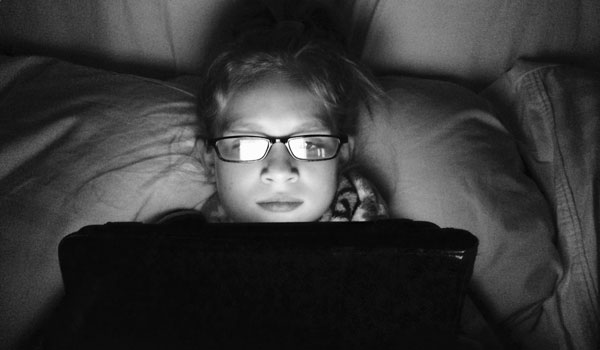New research (from the Division of Sleep and Circadian Disorders at Brigham and Women’s Hospital, the Division of Sleep Medicine at the Harvard Medical School, and the Institute of Aerospace Medicine in Cologne, Germany) shows that eReaders (Kindle, Nook, Ipad…) with an internal light significantly impair your ability to fall asleep, sleep well and make you feel more tired in the morning.

Here is some information to think about:
- Upwards of 90% of Americans use electronics within the hour before bed
- Mounting evidence from around the globe shows that gadgets that produce artificial light interfere with your ability to sleep
- Researchers believe that artificial light, especially short-wavelength-enriched light, has been shown to increase alertness, suppress melatonin and throw off your sleep clock.
The study cited above compared reading with an eReader with a back light versus a printed book in a dark room. They found that eReaders:
- delayed falling asleep
- reduced bedtime sleepiness
- reduced melatonin secretion
- shifted your circadian clock
- reduced alertness the next morning
If you have attended one of my work-life balance Keynote or workshop presentations where I discussed the 3 top strategies to get deep, quality, truly restorative sleep, then you know that I believe that light is one of, if not the most important factors influencing your ability to fall asleep and sleep well. Don’t believe me?
- Ask people who live in Alaska about the almost manic levels of energy they experience during the summer when the sunlight shines day and night. (Light)
- People who go camping are much sleeper much earlier in the evening. Have you ever thought about why? (Darkness)
- Why do many at conventions go outside during breaks? (Light)
While there are many reasons for the above phenonenons, how light and darkness trigger or impair sleep has got to top the list.
To help you, here are a couple excerpts from my new book, Change Your Day, Not Your Life – A Realistic Guide to Sustained Motivation, More Productivity and the Art of Working Well, and three tips on how to sleep better, including how to better manage light.
Have you ever thought, “I am tired all the time and I don’t know why?”
According to Dr. William Dement, founder of the American Academy of Sleep Medicine and past professor of one of the most popular classes at Stanford University, Sleep and Dreams, “For healthy young adults, there is only one cause, and that is sleep debt.”
All lost sleep is incurred as a debt. It can sneak up on you. When your debt builds up, it can leave you saying to yourself, “Why am I so tried?” Or worse, “Why don’t I want to do what I know I should?”
Below are my top 3 ideas for deep, restful, blissful sleep…
To get great sleep, a person must manage these three variables:
1. Darkness. The brain translates darkness as “time to sleep.” Turn off all the lights you can turn off, especially overhead lights. Instead use lamps, candles, or other soft, unobtrusive sources of light.
2. Coolness. Turn down the thermostat several degrees. (Ideal sleep temperature: 67-70 degrees fareinheit)
3. A predictable bedtime routine that sends strong signals to the brain that it is time to shut off the day and relax into sleep. As part of that routine—a mini-pattern—you might consider softer lighting for two hours before bedtime.
I look forward to reading your comments and answering any questions. -Andy
